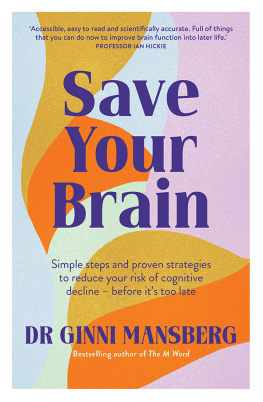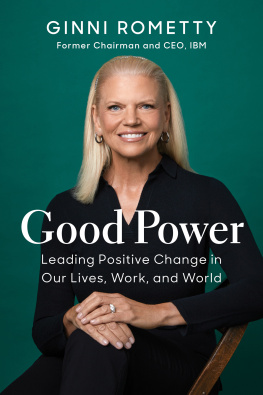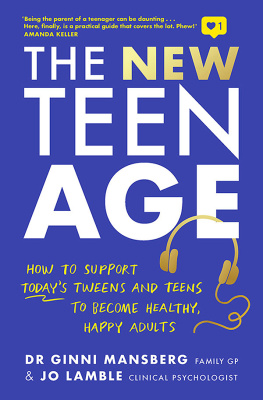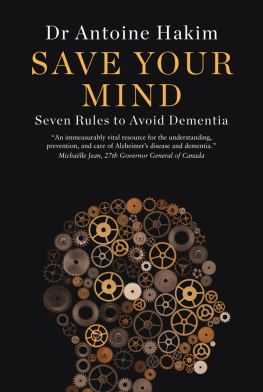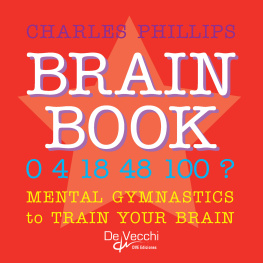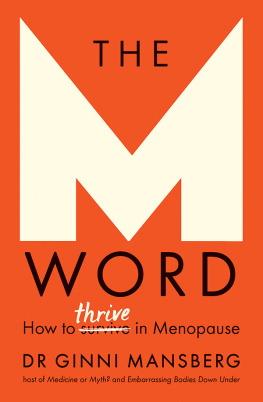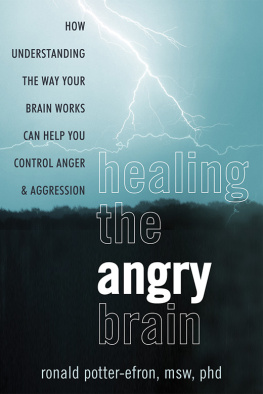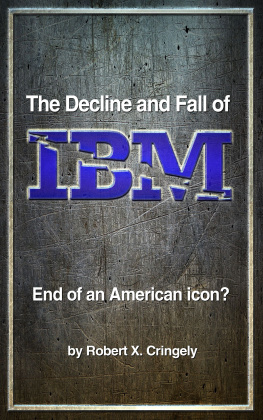Dr Ginni Mansberg - Save Your Brain
Here you can read online Dr Ginni Mansberg - Save Your Brain full text of the book (entire story) in english for free. Download pdf and epub, get meaning, cover and reviews about this ebook. year: 2023, publisher: Murdoch Books, genre: Art. Description of the work, (preface) as well as reviews are available. Best literature library LitArk.com created for fans of good reading and offers a wide selection of genres:
Romance novel
Science fiction
Adventure
Detective
Science
History
Home and family
Prose
Art
Politics
Computer
Non-fiction
Religion
Business
Children
Humor
Choose a favorite category and find really read worthwhile books. Enjoy immersion in the world of imagination, feel the emotions of the characters or learn something new for yourself, make an fascinating discovery.
- Book:Save Your Brain
- Author:
- Publisher:Murdoch Books
- Genre:
- Year:2023
- Rating:4 / 5
- Favourites:Add to favourites
- Your mark:
- 80
- 1
- 2
- 3
- 4
- 5
Save Your Brain: summary, description and annotation
We offer to read an annotation, description, summary or preface (depends on what the author of the book "Save Your Brain" wrote himself). If you haven't found the necessary information about the book — write in the comments, we will try to find it.
Save Your Brain — read online for free the complete book (whole text) full work
Below is the text of the book, divided by pages. System saving the place of the last page read, allows you to conveniently read the book "Save Your Brain" online for free, without having to search again every time where you left off. Put a bookmark, and you can go to the page where you finished reading at any time.
Font size:
Interval:
Bookmark:

As I conducted the interviews for this book, I invited each expert to share what they do in their own lives to maintain their brain health and prevent cognitive decline. While each of them does something a bit different, there are also lots of similarities. Here is a summary of their feedback.
- Everyone exercises. And were not talking slow strolling once a week. They do it properly.
- They all watch what they eat, but few are dogmatic about their diets, just generally going for a healthy diet with less junk food and processed foods.
- Nobody doesnt drink except for reasons unrelated to brain health.
- They are all dedicated to getting 78 hours of quality sleep a night well, as often as is practically possible.
- Only a couple of experts take brain supplements.
- All credit their work with keeping their brains cognitively active and with keeping them socially active.
- Most see a GP to get their vascular risk factors in check.
- None of them smoke.
These messages may be boring, but just keep healthy. Its not a secret magic pill, its not an ancient mysterious cure its the stuff doctors say all the time, whether its to help you prevent high blood pressure, diabetes, cancer or dementia. As Dr Trevor Chong so eloquently put it: People dismiss this advice as motherhood statements, like the GP just dishes this advice out because they have to say something, and theyre sick of hearing it. But theres excellent evidence that this works. Thanks to all the medical professionals who contributed to this project.
| Associate Professor Julie Dumas | Associate Professor, Clinical Neuroscience Research Unit, Department of Psychiatry, University of Vermont |
| Professor Ian Hickie | Co-Director of Health and Policy at the University of Sydneys Brain and Mind Centre |
| Associate Professor Hussein Yassine | Department of Medicine, Keck School of Medicine of the University of Southern California |
| Professor Ashley Bush | Head of the Oxidation Biology Unit and Director of the Melbourne Dementia Research Centre |
| Professor Rebecca Thurston | Pittsburgh Foundation Chair and Professor of Psychiatry, Psychology and Epidemiology, University of Pittsburgh |
| Dr David Perlmutter | MD board-certified neurologist, fellow of the American College of Nutrition, and five-time New York Times best-selling author of books including Brain Wash, Grain Brain and Brain Maker |
| Dr Michael Sughrue | Neurosurgeon and co-founder and chief medical officer at Omniscient Neurotechnology |
| Professor Rachel Buckley | Assistant Professor of Neurology at Harvard University and Massachusetts General Hospital |
| Professor Sharon Naismith | Chair of Psychology at the Charles Perkins Centre, the University of Sydney. She also heads the Healthy Brain Ageing Program at the Brain and Mind Centre. |
| Associate Professor Yen Ying Lim | Monash University Primary investigator of the Healthy Brain Project (healthybrainproject.org.au) and the BetterBrains Trial (betterbrains.org.au) Senior scientist at the Australian Imaging, Biomarkers and Lifestyle (AIBL) study |
| Associate Professor Caroline Gurvich | Deputy Director of Monash Alfred Psychiatry Research Centre and head of their Cognition and Hormones Group |
| Professor Victor Henderson | Professor of Neurology and Neurological Sciences at Stanford University and Director of the NIH Stanford Alzheimers Disease Research Center |
| Dr Allen Orehek | Managing Director and founder of the Dementia Prevention Center in Pennsylvania Author of Forget Alzheimers: How to prevent Alzheimers disease |
| Dr Tim Sharp | Psychologist and founder of The Happiness Institute Author of The Happiness Handbook, and 100 Ways to Happiness: A guide for busy people |
| Dr Loren Mowszowski | Clinical neuropsychologist and leader of the Cognitive Training research stream within the specialised Healthy Brain Ageing Program at the Brain and Mind Centre, the University of Sydney |
| Dr Trevor Chong | Cognitive neurologist and neuroscientist at the Turner Institute for Brain and Mental Health in Melbourne. He also leads the Monash Cognitive Neurology Laboratory. |
| Dr Joanna McMillan | Accredited practising dietitian, Adjunct Senior Research Fellow with La Trobe University, guest lecturer at the University of Sydney and a fellow of the Australasian Society of Lifestyle Medicine |
| Dr Raymond Schwartz | Neurologist and Clinical Associate Professor at the University of Sydney |
| Professor Elizabeth Twamley | Professor in Residence, Psychiatry, University of California, San Diego |
| Professor Dimity Pond | Professor of General Practice, Discipline of General Practice at the University of Newcastle |
| Professor Henrik Zetterberg | Professor of Neurochemistry at the University of Gothenburg, where he is the Head of the Department of Neurochemical Pathophysiology and Diagnostics. He is also the leader of the Fluid biomarkers for neurodegenerative diseases group at University College, London. |
| Wayne Markman | CEO of Symbyx, a company that makes and sells infrared devices that claim to alter neurodegenerative brain diseases by altering the gut microbiome through infrared light |
When I started writing this book, I was excited about the possibility of discovering the secret sauce for a young brain. Maybe there was a supplement I could take to undo the harm of sitting at my desk all day every day. Perhaps I could add some magic juice to my daily regimen, alongside my red wine and champagne, to split the difference?
But having interviewed 22 experts, dialled in to countless webinars and read close to 700 studies, I keep hearing the same things. There is no magic. There is no elixir of youth for the brain in the health food aisle of the supermarket or online. There are no expensive supplements or brain games that will work wonders. It comes down to basic good health with a big dose of common sense.
What is good for the heart is good for the brain. A healthy diet, a decent amount of exercise, drinking alcohol in the healthy range, keeping your blood sugar, blood pressure, weight, thyroid and cholesterol levels in the healthy range and getting enough sleep are key. Go to the dentist. Get your hearing checked and accept a hearing aid if youre going deaf. Look after your mental health; it is critical for your brain health. Use your brain, stay in the workforce if you can and be social. And have some compassion for your doctor. When they keep on repeating the message about healthy diet, and the need for regular exercise and sleep, its not because they have run out of ideas about how to keep us healthy. Its because these things are the real deal!!
For me, the hardest change has been embracing exercise. Ive had to make space for Tai Chi. Its a work-in-progress. Im still going for bushwalks on the weekends. But Im not beating myself up about it because so many of the other things on my healthy brain list have tick marks against them.
Writing this book has been the most mentally challenging thing I have ever done. Thank you for coming on this journey with me. I wish you long and lasting brain health.
Thank you to my late nana. You were just the best grandmother. Thank you for leaving Poland, for fighting so hard for your family and for every warm hug and sloppy kiss, your Yiddish nursery rhymes and your chicken soup. I hope I told you enough when you were alive how much I loved you and still do.
Next pageFont size:
Interval:
Bookmark:
Similar books «Save Your Brain»
Look at similar books to Save Your Brain. We have selected literature similar in name and meaning in the hope of providing readers with more options to find new, interesting, not yet read works.
Discussion, reviews of the book Save Your Brain and just readers' own opinions. Leave your comments, write what you think about the work, its meaning or the main characters. Specify what exactly you liked and what you didn't like, and why you think so.

